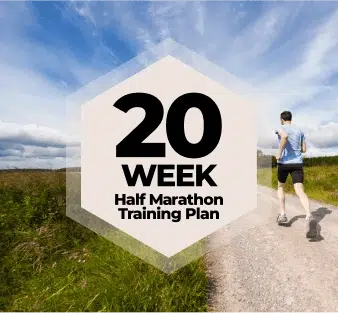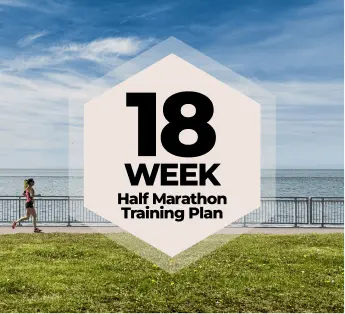To some runners, 20 weeks may feel like an eternity to dedicate to one race. But it can be really nice – and rewarding – to take your time preparing to tackle 13.1 miles on race day.
Our 20-week half marathon training plan is perfect for both beginners and intermediate runners alike. The plan below starts with four runs per week and kicks up to five days after six weeks of training.More experienced runners will be fine starting with five runs a week and focusing on building their overall volume as the training block goes on, Becky Wade Firth, a pro-marathoner, cross-country running coach, and HMG writer says.
If you’re a total beginner, start with our Couch to Half Marathon Training Plan for the first six weeks, then jump back over to this plan for the final 14 weeks to finish strong..
If you’re this far out, we also recommend downloading a training app like Runna. Whether you’re a beginner looking to finish your first or a veteran runner trying to PR, Runna is like having a dedicated running coach in your pocket. Use code HALF for 2 weeks of free training.
20-Week Half Marathon Training Schedule
| Week | Monday | Tuesday | Wednesday | Thursday | Friday | Saturday | Sunday |
| 1 | Off | 3 miles | Off | 3 miles | Off | 4 miles | 3 miles |
| 2 | Off | 3 miles | Off | 3 miles | Off | 4 miles | 3 miles |
| 3 | Off | 4 miles | Off | 4 miles | Off | 5 miles | 3 miles |
| 4 | Off | 4 miles | Off | 4 miles | Off | 5 miles | 3 miles |
| 5 | Off | 5 miles | Off | 5 miles | Off | 6 miles | 2-3 miles |
| 6 | Off | 5 miles | Off | 5 miles | Off | 6 miles | 2-3 miles |
| 7 | Off | 3 miles | 5 miles | 3 miles | Off | 7 miles | 2-3 miles |
| 8 | Off | 3 miles | 5 miles | 3 miles | Off | 7 miles | 2-3 miles |
| 9 | Off | 4 miles | 5 miles | 4 miles | Off | 8 miles | 2-3 miles |
| 10 | Off | 4 miles | 5 miles | 4 miles | Off | 8 miles | 2-3 miles |
| 11 | Off | 4 miles | 6 miles | 4 miles | Off | 9 miles | 2 miles |
| 12 | Off | 4 miles | 6 miles | 4 miles | Off | 9 miles | 2 miles |
| 13 | Off | 5 miles | 6 miles | 5 miles | Off | 10 miles | 2 miles |
| 14 | Off | 5 miles | 6 miles | 5 miles | Off | 10 miles | 2 miles |
| 15 | Off | 5 miles | 6 miles | 5 miles | Off | 10 miles | 2 miles |
| 16 | Off | 5 miles | 6 miles | 4 miles | Off | 11 miles | 2 miles |
| 17 | Off | 4 miles | 6 miles | 4 miles | Off | 12 miles | Off |
| 18 | Off | 4 miles | 6 miles | 4 miles | Off | 12 miles | Off |
| 19 | Off | 4 miles | 5 miles | 4 miles | Off | 6 miles | Off |
| 20 | Off | 4-5 miles | Off | 4-5 miles | Off | 13.1 miles | Off |
About This Training Schedule
Who It’s for
Because this training plan spans five months, it can be used by first-time and experienced half marathoners alike, Firth says. All you need is a willingness to devote 20 weeks to training and a foundation of a few runs per week with at least one of them being 3 to 4 miles. That base is essential for making sure your body is ready to handle the demands of half marathon training over several months.
Injury Prevention
This 20-week half marathon training plan is designed to escalate the mileage you’ll run each week more slowly than our other training plans. It has you bump up the mileage one week and repeating it the next, and then bump it up again the following week, and so on.
This training plan is ideal for preventing running injuries, Firth says. Here, you will develop both the physical stamina and the mental confidence that you’ll be able to complete 13.1 miles by showing you, very slowly, that you really can do it.
If you’re looking for more helpful advice on avoiding injuries in your training, we recommend:
- Cross-train on non-running days. Whether it’s cycling, swimming, or using an elliptical, cross-training can help maintain fitness while minimizing joint stress. This helps reduce the risk of overuse injuries. Incorporate at least one cross-training session per week on a non-running day. If you’re injury prone, you can swap out your run day and complete the mileage on the bike, in the pool, or another form of cross training to further minimize your injury risk.
- Include more rest days. With a longer training cycle, you can afford to take more rest days, which helps your muscles recover and rebuild. If you want active recovery, try light walks, yoga, or stretching to keep muscles flexible without overloading them.
- Commit to regular strength training. Over 20 weeks, you can build a lot of solid strength to make you a more powerful, more well-balanced runner. Strength training for runners will not only boost running efficiency and power but also improve your body’s durability, making you less prone to injuries, Firth says. Focus on exercises that target the glutes, core, and lower legs to build crucial stability and balance. One to two 30-minute sessions per week is a good goal.
What to Eat
Fueling is a cornerstone of any half marathon training plan, as what you eat as a runner gives you energy, boosts performance, and helps your body recover. While training, aim for your meals to be:
- 50% carb for fast energy
- 25% protein for muscle recovery
- 25% fat to sustain longer efforts
For daily nutrition, include whole grains, fruits, lean proteins, and healthy fats. While shorter runs (under 60 minutes) require little dietary change, longer runs (over 60 minutes) benefit from a higher carb intake the day before to fill glycogen stores.
During longer runs (over an hour), use mid-run fueling with 30-60 grams of carbs per hour from gels, chews, or sports drinks. Post-run, focus on a 4:1 carb-to-protein ratio, such as a banana with peanut butter, within 30 minutes to speed recovery and get ready for the next workout.
More Half Marathon Training Plans
8 Weeks • 9 Weeks • 10 Weeks • 12 Weeks • 14 Weeks • 16 Weeks • 18 Weeks
–
We independently produce all the content associated with training plans we feature on HalfMarathons.net. If you buy or sign up for services through the links on our site, we may receive an affiliate commission – which in turn supports our work.





